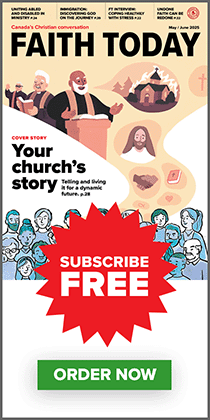The positive contribution of faith communities in Canada is being challenged, writes columnist Bruce Clemenger.

→en français
T
he positive contribution of faith communities in Canada is being challenged by a new series of initiatives targeting religious institutions and public religious expression.
Many of the challenges are grouped together in a disturbing committee report on the advancement of secularization presented to the Quebec government in August. The 300-page report provides a comprehensive vision of what government-imposed secularization could entail.
The 50 recommendations include making it easier to deny requests for religious accommodation, making it more difficult for religious organizations to rent rooms in publicly owned facilities (schools, libraries) and use public spaces.
They’d end the practice of notifying parents when children will be taught sex-related content. Universities could refuse to provide spaces for religious activities. A National Day of Secularism would be observed. Tax benefits and grants for religious organizations would be eliminated.
The report breathes new life into a recently controversial idea to remove "advancement of religion," one of four longstanding rationales for registering a charity. The B.C. Humanist Association had requested this from the federal finance committee last year (as well as an end to charitable status for "anti-abortion" organizations).
If "advancement of religion" were abandoned, many religious organizations would still be able to obtain charitable status – only by switching to one of the other three charitable purposes which are advancement of education, relief of poverty, or other purposes beneficial to the community.
The climate being created calls for silence about religious beliefs.
The federal finance committee included these two recommendations in a 2024 report to the finance department.
What is underlying this secularizing agenda? Partly, it’s a shift in thinking about the state’s relationship to religion. (Historically Canadian courts have interpreted religion very broadly to include atheism and agnosticism.)
In Canada there are no legal barriers to the state collaborating with religious organizations in the provision of services for the public good, to the funding of religious schools, or to allowing religious expression in public spaces. Such relationships have generally been accommodating and positive. Society greatly benefits from the contributions of religious organizations, particularly in health and social services.
Secularization agendas advance the shift from a secular society to a secularist society. Secular means open to all and privileging none – showing respect for all postures while not inhibiting public expression.
Secularist, on the other hand, means advocating the irrelevance of religion to public life and an openness to other sources of convictions which are to be celebrated exclusively.
An example is policy that forbids military chaplains from praying in public ceremonies. The policy restricts chaplains to giving secularist reflections.
The climate being created calls for silence about religious beliefs. A bushel basket, to adapt Jesus’ words in Matthew 5:15, is placed over religious freedom.
Such exclusion is often justified in the name of state neutrality, a concept that originated with the state’s duty to protect the freedom of religious groups from state intrusion, showing neither favour nor hindrance.
Now state neutrality is being used to justify governments abstaining from collaboration with religious institutions by no longer funding religious-based programs serving the public good and to restrict religious expression in government regulated spaces so not to be seen to support religion.
The benefit that religion and religious organizations contribute to Canadian society is well documented. A healthy relationship with the state would continue to foster constructive collaboration with all communities who seek the public good and cherish freedom.
When religious people defend our freedoms, speak civilly into issues and contribute constructively within the public sphere as an expression of our beliefs – these are the most effective antidotes to the presumed irrelevance of our faith. This is how we can stand on guard for a religiously free Canada.
Bruce J. Clemenger is senior ambassador and president emeritus of The Evangelical Fellowship of Canada, and author of The New Orthodoxy: Canada’s Emerging Civil Religion (Castle Quay, 2022). Illustration: Bernardo Ramonfaur